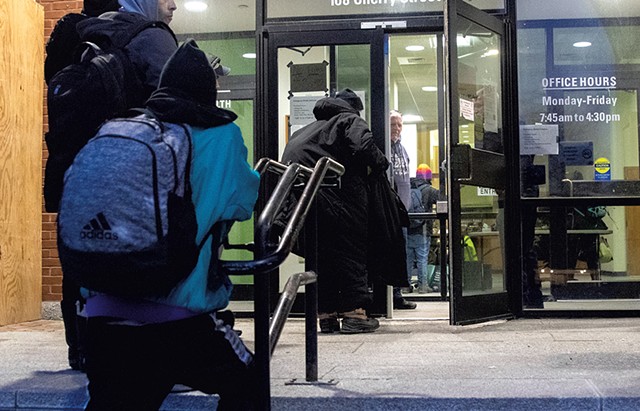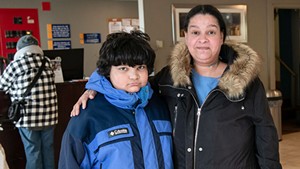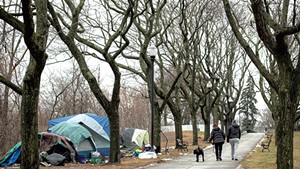
- Colin Flanders ©️ Seven Days
- People lining up to get into Burlington's temporary shelter on Monday night
Vermont officials' attempt to wind down part of the state's emergency motel program last week left hundreds of people looking for new housing, sent social workers scrambling to help and led the Vermont National Guard to set up temporary shelters that went largely unused.
The March 15 end date for some in the program had been established months earlier, but lawmakers blamed Gov. Phil Scott's administration for bungling the evictions. The situation prompted complaints from local officials, who said they were not included in the planning, and housing advocates, who decried the hasty plan as a cruel and unnecessary injustice. It amounted to the state kicking people out of housing — while simultaneously rushing to erect slapdash shelter accommodations that brought to mind the state's recent emergency flood-response efforts.
State leaders have struggled to reduce homelessness and curb the costs of providing temporary housing. Little progress has been made since both spiked at the beginning of the pandemic four years ago, though the state recently reduced the rate it pays private motels, from $132 to $80 per night.
"How this has played out is really shocking and shameful," said Lindsey Owen, executive director of Disability Rights Vermont, a nonprofit advocacy group.
Last summer, some 800 people lost their pandemic-era motel vouchers. But about 2,500 people were still in the motels until last week, when about 500 more — mostly single people under the age of 65 — lost their temporary housing. They had been using vouchers available to homeless people as part of a wintertime program that offered motel stays nightly through March 15. Single-night vouchers will be available through April 15 when the temperature dips below 20 degrees or snow is forecast.
Legislators had passed a bill earlier this month that would have kept many of the seasonal participants in motels through June 30, when the larger program is scheduled to end, if they had certain health conditions or a disability.
But last week, the Department for Children and Families, which administers the vouchers, imposed a requirement that motel residents get a health care provider to confirm they are eligible to stay. Those forms were not distributed until hours before the deadline. Still, about 70 disability waivers were processed by move-out day. That number had reached 114 by Monday afternoon, according to DCF Commissioner Chris Winters.
Owen, of Disability Rights Vermont, said the medical sign-off requirement, rolled out on such short notice, put an unreasonable burden on motel residents. "I can't even get in to my own doctor in seven days," she said.
The department has not issued formal guidelines to health care providers, but Winters acknowledged that the state has been discouraging them from signing the forms for patients without a serious health condition just to preserve their housing. The department plans to review waiver forms and will follow up if certain providers have signed an especially high number, Winters said.
"We just want to make sure they're taking that responsibility really seriously and understand the implications if they stretch that," Winters said.
The legislature allocated enough funds in the Budget Adjustment Act to cover about 1,500 motel rooms each night through June, Winters said, and there's already some competition for slots among families and elderly guests.
Vermont Legal Aid and several homelessness organizations asked a judge to halt the evictions, arguing that they ran afoul of recent legislation by not giving residents time to prove their eligibility. The state, the plaintiffs contended, was "manufacturing a crisis and causing an inhumane, traumatic displacement that does not need to occur." A Chittenden County judge declined to immediately intervene and instead scheduled a hearing for Thursday, March 21.
In the meantime, the Scott administration called upon the Vermont National Guard to help convert buildings in Burlington, Rutland, Berlin and Brattleboro into crude sleeping quarters for those getting the boot from the motels. Scott officials said the temporary shelters, which would stay open for no more than a week, would allow homeless people a chance to look for another place to stay or complete the paperwork that would allow them to return to a motel room.
No one showed up to sleep at the 100-cot shelter in Brattleboro, located in a defunct Vermont Yankee office building, during the first four nights. Only one person used the Berlin site. The numbers were highest at the recently vacated state office building on Cherry Street in downtown Burlington.
The lack of turnout at mass shelters was a sign of poor planning, not a lack of need for emergency housing, advocates said. Cots were arranged in open rooms, affording no privacy. Guests could not bring most personal belongings to the shelters, nor could they shower at them. Some of the shelters were difficult to access without a car. And there was uncertainty about how long they'd stay open. In an interview on Monday, Winters said he still wasn't sure whether they'd close on Thursday, March 21, or the following day.
If the state's goal was to make sure the shelters were "as minimally utilized as possible," said Frank Knaack, executive director of the Housing & Homeless Alliance of Vermont, "they couldn't have set them up in a better way."
Winters acknowledged that there's "plenty of blame to go around" for how the past week played out. He said legislators' frequent, last-minute changes to the motel program deadlines and eligibility rules have made preparations especially difficult. Lawmakers passed the Budget Adjustment Act on March 1, and Winters' department issued notices to clients about the eligibility changes included in the bill on March 13.
Rep. Theresa Wood (D-Waterbury), the House Human Services Committee chair, called the 12-day delay in notifying motel residents about eligibility "totally unacceptable." In a statement, she said the situation reflected the Scott administration's desire to "unhouse" people in the seasonal program.
Ideally, Winters said, lawmakers would have adjusted the $50 million-plus annual program earlier — or maybe not at all.
"We keep thinking this is going to end, and then it doesn't end, and then the eligibility shifts, and then there's a new form to use," Winters said. "All of those things make it really challenging to plan ahead."
Winters considered the emergency shelters a stopgap measure in light of the short notice his department managed to give residents. But the Scott administration has been talking for months about setting up mass congregate shelters in place of the more expensive motel program.
"It was also kind of an experiment," Winters said of this week's operation, to see whether the temporary shelters are "something that we should do or could be doing" when it comes time for another round of motel evictions.
Scott notified host communities about the mass emergency shelters days before they opened, setting off criticism. Burlington Mayor Miro Weinberger had asked the state last year to fund a new shelter at the Cherry Street state office building, but officials had declined. The mayor criticized the sudden, temporary change of course, made without any coordination with local officials or social service providers.
Weinberger toured the site last Friday, then asked the state to tweak its plan, including by providing secure storage for guests' weapons, rather than prohibiting them. He also asked officials to adjust the hours of operation to mesh with local services and avoid overlap with students' morning commute to the nearby Burlington High School. The state declined to make those changes, Weinberger's office said.
Last Friday night, a uniformed member of the National Guard and a sheriff's deputy stood at the Burlington building's entrance while other workers sat idly inside, waiting for would-be guests. Only three people showed up over the course of the night, according to the state. Two others slept at the Rutland shelter, meaning just five people used the four shelters on the first night.
"We're really not sure why" so few people used the state-run shelters, Winters said. "It's really hard to tell where people went, what options they might have," he added. "I just hope the best for them."
At Harbor Place, a hotel site in Shelburne operated by Champlain Housing Trust, 10 people had been staying under the winter program. Four had their stays extended, community relations director Chris Donnelly said. Of the six guests who left, two planned to pay for rooms at another motel for a few nights, two planned to couch-surf, and two "will be camping in the woods," Donnelly said. None mentioned using the state-run shelters, he added.
The Champlain Valley Office of Economic Opportunity bought dozens of tents and sleeping bags to hand out, homeless outreach services coordinator Adam Hall said. Only a few people came to the nonprofit's Community Resource Center on Monday to request a tent, he said.
The state-funded center, located in Burlington's Old North End next to the local food shelf, saw higher-than-usual foot traffic, but Hall has yet to see a rush of newly desperate people. He's not surprised — it took a week or two after the summer evictions for the full impacts to become evident.
The resource center counted 193 unsheltered people in February and 75 who were homeless but staying in motels. He expects many of those 75 to lose their shelter in the weeks and months ahead. How quickly, nobody knows. People living in the motels have become accustomed to a perpetual uncertainty about when they might be evicted. Even move-out deadlines have become harder to take seriously.
"It keeps pushing that stress forward," Hall said. "To live in that space all the time, it's really damaging to people's mental health."
The Burlington shelter had 30 people stay over on Monday night. The city-run, state-funded winter warming shelter on South Winooski Avenue had closed for the season on Monday morning. It had been serving about 30 people nightly.
Many who'd been staying there migrated to Cherry Street, where more than 20 people were already lined up in a freezing drizzle for the 7 p.m. opening. One man, who declined to give his name, said he'd been staying at the South Winooski Avenue site for the past few nights. Newly homeless, he was looking for a way to avoid tenting. He asked a reporter which day the Cherry Street shelter would be shutting down; he needed to plan for it.
No one, not even the officials running the shelter, could answer his question.













Comments
Comments are closed.
From 2014-2020, Seven Days allowed readers to comment on all stories posted on our website. While we've appreciated the suggestions and insights, right now Seven Days is prioritizing our core mission — producing high-quality, responsible local journalism — over moderating online debates between readers.
To criticize, correct or praise our reporting, please send us a letter to the editor or send us a tip. We’ll check it out and report the results.
Online comments may return when we have better tech tools for managing them. Thanks for reading.